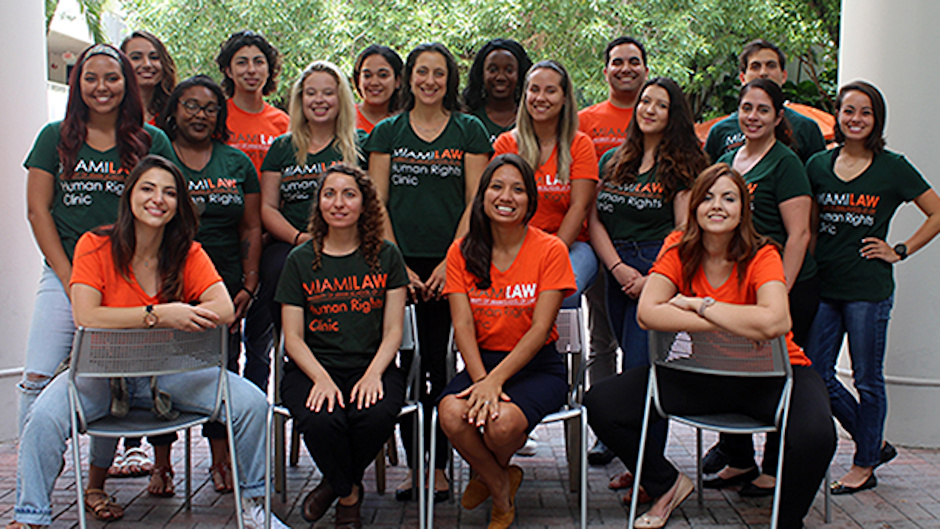When the Fall semester began in mid-August, most students in the Human Rights Clinic had only a vague notion of what advocacy before the United Nations meant. By the first week in October, eleven HRC students, under the supervision of Professors Caroline Bettinger-Lopez, Tamar Ezer, and Denisse Córdova Montes, were knee-deep in writing four Universal Periodic Review reports to the UN Human Rights Council, alleging human rights violations by the United States.
The UPR is a mechanism of the U.N. Human Rights Council that began in 2006 and is responsible for reviewing the human rights record of every government that is a member of the U.N., regardless of whether that country has ratified any U.N. human rights treaty. It is the sole procedure that allows the human rights records of all U.N. member states to be reviewed and assessed for compliance, providing a unique opportunity for the international community to discuss all human rights issues around the world.
The UPR is an inter-governmental peer review process where other governments make questions and recommendations concerning a state’s human rights record. Thus, political relationships between states can affect the types of questions and recommendations made to states under review. The UPR is also a way for countries to show what steps they have taken to address human rights violations, or otherwise improve the conditions of their country; this has an immense power to influence other countries to do the same.
Documentation and reporting of human rights violations by civil society is an important contribution that influences the UPR process. Civil society organizations are invited to participate in national consultations held by the country under review, send information on the human rights situation in the country, and lobby members of the UPR before and during the actual review. After the review, a strong and organized civil society is of crucial importance for the successful monitoring and implementation of the UPR recommendations.
“The UPR is a significant process because it brings civil society together around important human rights issues, as well as promotes dialogue between government and civil society,” said Córdova Montes, the clinic’s practitioner-in-residence.
In preparation for the third UPR cycle, which will take place in May 2020, the four HRC student teams conducted interviews with civil society organizations, researched international and national laws and submitted four reports on October 3, 2019. The Human Rights Clinic’s reports address issues ranging from access to justice for immigrant survivors of gender-based violence to low-paid workers’ experience with workplace sexual violence and harassment to housing and homelessness, and the right to food.
“Our clinic’s deep work with community organizations and national and global NGOs enables us to play a direct role in formulating ideas, questions, and recommendations to the Human Rights Council,” said Ezer, the clinic’s associate director.
A team of students focused on addressing workplace sexual harassment affecting low-paid immigrant women in South Florida since the beginning of the year had the opportunity to shed international light on a local problem.
“It was a very meaningful experience to have translated what we heard in interviews with local and national NGOs and affected people into a submission to the U.N.,” said third-year student Carla Carden. In addition, through their work on the UPR submission, the student team had the opportunity to broaden their network of local community groups and include national groups working on workplace gender-based violence, such as the National Domestic Workers Alliance.
The U.S. Human Rights Network is leading U.S. organizing efforts around the UPR. Prior to submitting their report on the harmful effects of SB 168 – Florida’s new anti-immigration law – on immigrant survivors of gender-based violence, second-year students Amanda Suarez and Jamila Flomo made a presentation to the USHRN. The Human Rights Clinic will continue engaging in advocacy work leading up to the UPR of the U.S. in May 2020 in Geneva.
More on the Human Rights Clinic.
***********************************************************************************
Violations of the Human Right to Effective Protection Before the Law: Access to Justice for Immigrant Survivors of Gender-Based Violence in the U.S. by Jamila Flomo, Amanda Suarez, and Professor Caroline Bettinger-Lopez. Signatories included: UMHRC, Rural Women’s Health Project, Florida Legal Services, Florida Council Against Sexual Violence.
Violations of the Human Right to Equality and Non-Discrimination in the U.S.: Low-Paid, Migrant Workers’ Experiences with Workplace Sexual Harassment by Carla Carden, Kadian Crawford, Alexis Bay, and Professor Denisse Cordova Montes. Signatories included: Voces Unidas (Miami Workers Center, WeCount!, Community Justice Project, and UMHRC) and National Domestic Workers Alliance.
Housing and Homelessness in Miami-Dade County, Florida, by Conor Arevalo, Jennifer Gonzalez, Melanie Ng, David Stuzin, and Professor Tamar Ezer. Signatories included: UMHRC, UM Environmental Justice Clinic, The Alliance for GLBTQ Youth, Struggle for Miami’s Affordable and Sustainable Housing, Miami Workers Center, National Economic & Social Rights Initiative, and National Law Center on Homelessness & Poverty.
The Human Right to Food in the Context of Political Participation, Equality and Non-Discrimination by Raul Herrera, Isabelle Janssen, Gabriela Valentin Diaz, and Professor Denisse Cordova Montes. Signatories included: UMHRC, WhyHunger, FIAN International, Food Studies Program at Syracuse University, Drexel University Center for Hunger Free Communities, Northwest Harvest, Molly D. Anderson, Joseph Kiefer, Lisa Mase, Robert Ojeda, Karen Washington.

